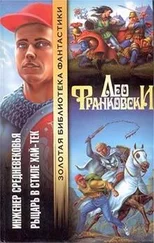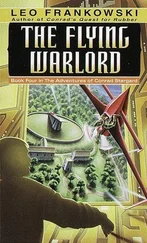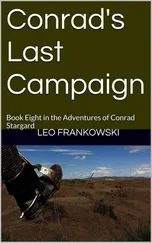Лео Франковски - The High-Tech Knight
Здесь есть возможность читать онлайн «Лео Франковски - The High-Tech Knight» весь текст электронной книги совершенно бесплатно (целиком полную версию без сокращений). В некоторых случаях можно слушать аудио, скачать через торрент в формате fb2 и присутствует краткое содержание. ISBN: , Жанр: Альтернативная история, на английском языке. Описание произведения, (предисловие) а так же отзывы посетителей доступны на портале библиотеки ЛибКат.
- Название:The High-Tech Knight
- Автор:
- Жанр:
- Год:неизвестен
- ISBN:0-345-32763-2
- Рейтинг книги:4 / 5. Голосов: 1
-
Избранное:Добавить в избранное
- Отзывы:
-
Ваша оценка:
- 80
- 1
- 2
- 3
- 4
- 5
The High-Tech Knight: краткое содержание, описание и аннотация
Предлагаем к чтению аннотацию, описание, краткое содержание или предисловие (зависит от того, что написал сам автор книги «The High-Tech Knight»). Если вы не нашли необходимую информацию о книге — напишите в комментариях, мы постараемся отыскать её.
The High-Tech Knight — читать онлайн бесплатно полную книгу (весь текст) целиком
Ниже представлен текст книги, разбитый по страницам. Система сохранения места последней прочитанной страницы, позволяет с удобством читать онлайн бесплатно книгу «The High-Tech Knight», без необходимости каждый раз заново искать на чём Вы остановились. Поставьте закладку, и сможете в любой момент перейти на страницу, на которой закончили чтение.
Интервал:
Закладка:
And armor distributes the energy of a blow in space. If the blade can't cut the steel, it must push it forward. The bigger the plate of armor, the wider the area, the lower the force felt by the wearer. With chain mail, the area under each link is small and while it's a big improvement over bare skin, it can't compare with a solid metal plate.
Of course, there are practical limitations on how thick the padding can be and how big you can make the plates. You have to be able to move in the stuff.
But what I was going to wear would be two hundred years more advanced than what my opponent would have, and that just might make the difference. In combat, high technology means higher than your opponent's.
And while all the practice and armor-making was going on, work continued at Three Walls. In addition to the wall-apartment house, the church, the inn, the barn, the icehouse, the smokehouse (which was to double as a sauna), and the factory, we now needed a coke oven and a blast furnace.
The blast furnace would have to wait a bit, but I had to know if our coal could be turned into coke. Not all types of coal can be made into coke in an old-style beehive oven. Building a modern coke oven was well beyond our capabilities.
The boys' cave had to be enlarged and the iron ore extracted using bronze picks and shovels that I was having made up.
And we still hadn't struck coal yet. The masons finally got sufficiently frustrated that they built a big wood fire and threw on all the limestone rubble that they had been generating in the course of making blocks. They kept adding wood and limestone for a week, and when the fire was out, they had quick lime, calcium oxide. Adding water and sand to it made mortar.
When I asked them why they hadn't told me that you could make lime with a wood fire, they said I hadn't asked. That night at supper, I made a speech about how it was important to keep me informed about that sort of thing, but I don't think that it sank in very deep. One of the men said that they saw me doing so many crazy things that if they told me about every one of them, they wouldn't have any time left to work.
Someday, I'd make believers out of them.
Soon, foundations were being laid and people could see signs of progress. I think they had been starting to worry about being stuck in the woods for the winter with only our temporary shelters, because the laying of the foundations made them all look more confident.
The Pruthenian children had mostly fit right in. Looking at them, you couldn't tell the difference between them and the Polish children we had of the same age. Their accents were thick as a millstone, but even there progress was being made. At least we could understand them. To give them religious instruction, the priest had begun staying over until Monday afternoons, and many of them were already baptized. Most of them were starting to learn the trades of their adopted parents. But sometimes, when they thought you weren't looking at them, you could see written on their faces the horror of all that they had been through. That increased my resolve; those children were not going to go back into slavery.
Then there was Anna. I'd kept my promises to her and made a big sign with all the letters on it so she could spell things out. She was still attending church regularly, and the priest was growing increasingly scandalized. He finally broached the subject.
I'd known that it was coming, and had my response ready. I said that Anna was a full citizen of Three Walls, she was smarter than half my workers, and if she wanted to live a moral, Christian life, I certainly wasn't going to stop her. I said it in a straight, deadpan way. Father Stanislaw just shook his head and walked away. And Anna continued to go to church.
Vladimir was growing increasingly depressed as winter approached. For one thing, his brother visited him and said that their father was still violently angry with him, and his family meant a lot to Vladimir. I think there was even more to his depression than that, but I couldn't find out what it was. He wasn't pleasant company anymore, and I found myself looking forward to my trips alone.
I timed my next visit to Okoitz so that I could see the trial by combat at Bytom before returning to Three Walls.
The harvest was in full swing at Okoitz.
In a medieval farming community, the harvest was the busiest time of the year. They had six or eight weeks to bring in all the food they would eat throughout the year, and everything else done in the year was mere preparation for this event. And despite the cloth factory and other improvements I'd made, Okoitz was still predominately a farming community.
Everyone got up with the first, false dawn and worked almost nonstop until it was too dark to see, often falling asleep still in their work clothes. Working eighteen hours a day, these people consumed a huge amount of food, more than six loaves of broad per capita per diem, plus other food.
I think that much of the Slavic temperament must be the result of a long-term adaptation to the weather and farming conditions of the north European plain. When the need arises, we are capable of working for months on end with only a little sleep, doing incredible amounts of work, three or four times what people from gentler climates could do. Incredible, that is, to any outsider. To us, it seems only normal.
But when the need is not there, as happens during the long northern winter, we become lethargic, food consumption drops, and spending twenty hours a day in bed seems like a pleasant thing. Having someone to help you keep warm is nice, too, and that also is a part of the Slavic temperament.
In a desert country, the cutting edge of nature is that there is sometimes not enough water. When it is in short supply, and there is not enough for everyone, every man becomes the competitor, the natural enemy of every other man. That is reflected in the temperament of the desert peoples, and by Polish standards they become harsh, ruthless, and cruel.
But when the great killer is not the lack of food or water, but the cold of a five-month winter, every person about you is one more source of heat! The more your friends, the larger your family, the greater your chances of surviving the winter. Good interpersonal skills, concern for others, and love have high survival value. So does a strong sense of group loyalty.
During the long winter, there is little to do much of the time but talk, and any subject of conversation is welcome. Things are debated at length, and there is time for everyone to have his say. Decisions are made by eventual consensus.
But when it's time to work, there is no more time for talk. Things must be done, and soon, or winter will close in again without enough food stored up. At such times, we Slavs work well as a group, without argument, and with a solidarity that an Arab couldn't conceive of.
A hundred wheelbarrows had been made to my specifications, and they stayed in steady use. Split logs had been laid along the paths to make pushing them easier.
Everyone was friendly, but busy, so I was left to look things over myself. The seeds I had brought in were doing fairly well. There were small patches of corn, beans, winter squash, and pumpkins that could be left until the more critical crops-the grains-were in. The tiny patches of hybrid grains had been harvested and carefully been kept separate from the standard crops. In fact, Count Lambert had them stored in his own bedroom, to make sure that they wouldn't be eaten by mistake. He showed them to me that night.
"Look at this, Sir Conrad!" He held open a sack with a few pounds of rye in it. "All that grew from the one tiny handful of seed you brought!"
It looked normal enough. "What of it, my lord?"
"What of it? Why, that must be a return of fifty to one! Don't you realize that five to one is considered excellent, and three to one is normal?"
Читать дальшеИнтервал:
Закладка:
Похожие книги на «The High-Tech Knight»
Представляем Вашему вниманию похожие книги на «The High-Tech Knight» списком для выбора. Мы отобрали схожую по названию и смыслу литературу в надежде предоставить читателям больше вариантов отыскать новые, интересные, ещё непрочитанные произведения.
Обсуждение, отзывы о книге «The High-Tech Knight» и просто собственные мнения читателей. Оставьте ваши комментарии, напишите, что Вы думаете о произведении, его смысле или главных героях. Укажите что конкретно понравилось, а что нет, и почему Вы так считаете.










